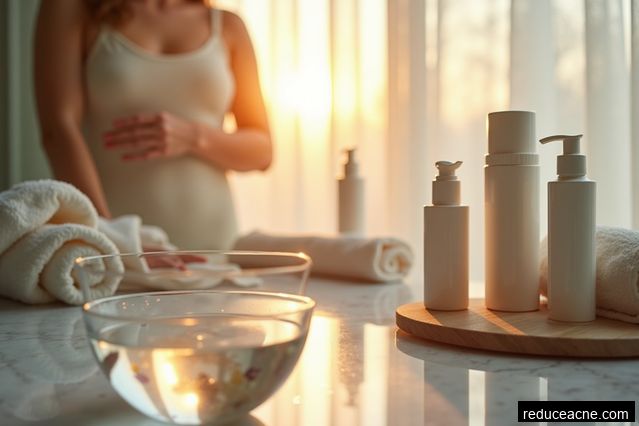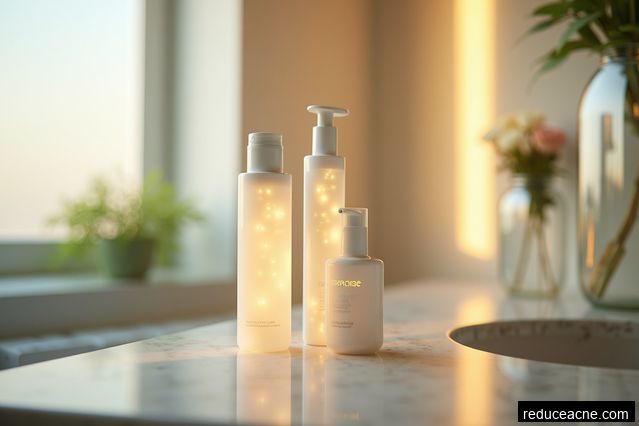Introduction
Acne, an issue synonymous with teenage angst, is not confined solely to adolescence. An increasing number of adults are also grappling with it, making it a universal skin concern. Acne-prone skin needs special care, and who better to guide us than dermatologists, the experts in skin health? This article will delve into dermatologist-recommended daily skincare routines for acne-prone skin; demystifying the science behind it, exploring the benefits, and providing practical advice to apply.
The importance of a tailored skincare routine for acne-prone skin cannot be overstated. According to a study by the Journal of the American Academy of Dermatology, over 50 million Americans are affected by acne annually. Hence, understanding how to manage it is vital for the majority of the population. Now, let's delve into the dermatologist-approved daily skincare practices for acne-prone skin.
In this introductory section, it's crucial to delve deeper into the various causes and triggers of acne beyond the common perception. Factors such as hormonal imbalances, stress, and genetic predispositions can all play a significant role in exacerbating this skin condition. Understanding these underlying causes is essential for developing effective treatment strategies tailored to individual needs. Additionally, exploring the psychological impact of acne beyond its physical manifestations can provide valuable insights into the holistic management of this issue.
Understanding Acne-Prone Skin
Acne-prone skin is characterized by frequent breakouts, usually due to overactive sebaceous glands producing excess sebum. Dermatologist Dr. Sandra Lee explains, "When your pores clog with dead skin cells and oil, blackheads, whiteheads, or pimples may form." This formation is further exacerbated by factors such as hormones, diet, stress, and use of unsuitable skincare products. Comprehending this is the first step in managing acne-prone skin.
According to a study in the Journal of Clinical and Aesthetic Dermatology, people with acne-prone skin have a different skin microbiome balance compared to those with clear skin. Their skin tends to have a higher presence of P. acnes bacteria, which plays a significant role in inflammation and acne formation. Therefore, managing acne requires a multi-faceted approach that maintains skin health and reduces inflammation.
Understanding acne-prone skin goes beyond just identifying breakouts. It involves recognizing triggers like hormonal imbalances, stress, and even certain skincare products. For instance, using harsh cleansers can strip the skin of essential oils, leading to increased sebum production and subsequent breakouts. Moreover, factors like diet and genetics play a crucial role in how skin reacts to different treatments. By delving deeper into these nuances, individuals can tailor their skincare routines to better manage and prevent acne flare-ups.
Cleansing and Exfoliating
Effective cleansing is integral for acne-prone skin. Dermatologist Dr. Whitney Bowe recommends gentle cleansing twice a day to remove excess oil, dirt, and dead skin cells. Use a cleanser with salicylic acid or benzoyl peroxide, ingredients known for their acne-fighting properties. For example, the Neutrogena Oil-Free Acne Wash contains salicylic acid and is specifically formulated for acne-prone skin.
Exfoliation is equally important as it helps unclog pores. However, it should be done sparingly (once or twice a week) to avoid skin irritation. An example of a suitable exfoliator is the Paula’s Choice Skin Perfecting 2% BHA Liquid Exfoliant, which has beta-hydroxy acids that penetrate deep into the pores to remove dead skin cells and excess oil.
When it comes to exfoliating, incorporating a chemical exfoliant like salicylic acid can work wonders for unclogging pores and reducing inflammation. This gentle yet effective ingredient targets acne-causing bacteria while promoting skin cell turnover, revealing a smoother complexion. Pairing this exfoliating step with a hydrating cleanser containing soothing ingredients like chamomile or aloe vera can help maintain skin's balance and prevent over-drying. Remember, consistency is key in achieving clear, radiant skin through a well-rounded cleansing and exfoliating routine.
Moisturizing and Sun Protection
Despite the common misconception, moisturizing is crucial even for oily, acne-prone skin. It helps maintain the skin's natural barrier, preventing further breakouts. Dermatologist Dr. Joshua Zeichner recommends oil-free moisturizers, like the Cera Ve AM Facial Moisturizing Lotion, which also offers SPF 30 sun protection. Sunscreen is essential as UV exposure can darken acne scars and trigger breakouts.
For nighttime, Dr. Zeichner suggests using a moisturizer with retinol, like the Neutrogena Rapid Wrinkle Repair Night Moisturizer. Retinol helps in skin cell turnover, reducing acne and acne scars. However, it can make the skin sensitive to the sun, so it's ideal for nighttime use.
Incorporating SPF into your daily skincare routine is just as essential as moisturizing. Opt for a broad-spectrum sunscreen that shields against both UVA and UVB rays to protect your skin from premature aging and potential skin cancers. Additionally, consider using a moisturizer with built-in sun protection for added convenience and efficiency. This dual-action approach ensures that your skin stays hydrated and safeguarded from the harmful effects of sun exposure, maintaining its health and youthful appearance in the long run.
Treating Acne
Acne treatments aim to reduce inflammation and prevent scarring. Dermatologist Dr. Dendy Engelman suggests incorporating spot treatments containing sulfur or benzoyl peroxide, like the Mario Badescu Drying Lotion or the La Roche-Posay Effaclar Duo Acne Treatment. These products target the acne-causing bacteria and help dry out the pimples.
In severe cases, prescription treatments like topical retinoids or oral medications may be necessary. It's crucial to consult a dermatologist to assess the severity of acne and determine the best treatment plan.
In addition to traditional topical treatments, emerging technologies like blue light therapy are gaining popularity in treating acne. This non-invasive procedure targets acne-causing bacteria deep within the skin, offering a gentle yet effective solution for stubborn breakouts. Furthermore, incorporating skincare products containing salicylic acid or benzoyl peroxide can help to unclog pores and reduce acne lesions, providing a comprehensive approach to managing acne outbreaks. Consulting with a dermatologist can help individuals tailor a personalized treatment plan to address their specific skin concerns.
Conclusion
In conclusion, managing acne-prone skin necessitates a comprehensive routine that includes proper cleansing, exfoliating, moisturizing, sun protection, and treatment. The choice of products should be suited to the skin type and condition, preferably with ingredients known to combat acne. It's important to remember that consistency is key, and results may take time to manifest.
While this guide offers a general skincare routine, each person's skin is unique. Therefore, it's essential to consult with a dermatologist to create a personalized skincare plan. As highlighted by these dermatologist insights, understanding and caring for acne-prone skin is not an insurmountable task. With the right knowledge and products, it's possible to manage acne and achieve healthier skin.
As we wrap up our discussion on managing acne-prone skin, it's crucial to emphasize the significance of consistency in skincare routines. While finding the right products and treatments is essential, sticking to a routine is equally important for long-term results. This means being diligent in cleansing, moisturizing, and treating your skin regularly to maintain its health and prevent breakouts. Remember, patience is key when it comes to skincare – results may not be immediate, but with perseverance, you can achieve clearer, healthier skin.







